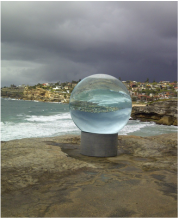
This Grist article ends with some great, hard-won insight from Alex Fenton: "Public interest types, across the board — we think because we’ve said something, know something, or done something, that everybody else knows it. We don’t realize the bubble we live in.
He explains: "It’s only when you’ve said something so many times that you’re utterly and completely sick of it that someone has even heard it. Marketers understand this. Scientists and people from the humanities less so — they get bored by it. “We already had our op-ed in the New York Times! The world knows!”
"But it takes so much more repetition than that. I mean, as a country, even the intelligentsia has not fully realized that we are in a planetary emergency and we are running rapidly out of time. I like to say, “What if they gave a planetary emergency, and nobody noticed?”
This is something relevant to just about anyone I've ever worked with, and is so very useful to remember if you want to leap the gap between your in-crowd and new audiences. [More over the fold]
He explains: "It’s only when you’ve said something so many times that you’re utterly and completely sick of it that someone has even heard it. Marketers understand this. Scientists and people from the humanities less so — they get bored by it. “We already had our op-ed in the New York Times! The world knows!”
"But it takes so much more repetition than that. I mean, as a country, even the intelligentsia has not fully realized that we are in a planetary emergency and we are running rapidly out of time. I like to say, “What if they gave a planetary emergency, and nobody noticed?”
This is something relevant to just about anyone I've ever worked with, and is so very useful to remember if you want to leap the gap between your in-crowd and new audiences. [More over the fold]
Fenton says: "The famous story about this is a classic marketing story. The Dial soap ads used to say “Aren’t you glad you use Dial?” And then the second sentence was, “Don’t you wish everybody did?” After about 10 years of advertising with that statement, they were able to drop the second sentence. That’s because all you had to do was say “Aren’t you glad you used Dial,” and everyone would say, to themselves, “Don’t you wish everybody did?” We need to understand that it takes a lot more repetition to absorb things."
Now based in Melbourne, Fenton has been working on campaigns since 1979 - so he's not just talking from theory.
All my clients are doing really interesting and valuable work. But they live and breathe it. Sometimes it is has been their main focus from post graduate studies in their twenties into a career spanning decades. It is understandably difficult for them to see the issue with an outsider's eyes. Many of them don't much like the term PR because of its connotations of spin and falseness. (I much prefer communications, too, but that's another blog post).
But really 'PR' only stands for 'public relations' - it is just a term trying to describe a link between insiders and outsiders. Or experts and non-experts if you are tackling a policy, science or research topic. So I always hope that when we do form a partnership for communications that bringing an outsider's eye brings value to a project. It's typical that you're only getting traction about the time that your experts or spokespeople are sick to the gills of talking about the topic. That's exactly the time to keep talking and empower more non-experts to contribute - because it's also when other voices will take notice and start to chime in. Read the whole thing.
Now based in Melbourne, Fenton has been working on campaigns since 1979 - so he's not just talking from theory.
All my clients are doing really interesting and valuable work. But they live and breathe it. Sometimes it is has been their main focus from post graduate studies in their twenties into a career spanning decades. It is understandably difficult for them to see the issue with an outsider's eyes. Many of them don't much like the term PR because of its connotations of spin and falseness. (I much prefer communications, too, but that's another blog post).
But really 'PR' only stands for 'public relations' - it is just a term trying to describe a link between insiders and outsiders. Or experts and non-experts if you are tackling a policy, science or research topic. So I always hope that when we do form a partnership for communications that bringing an outsider's eye brings value to a project. It's typical that you're only getting traction about the time that your experts or spokespeople are sick to the gills of talking about the topic. That's exactly the time to keep talking and empower more non-experts to contribute - because it's also when other voices will take notice and start to chime in. Read the whole thing.
 RSS Feed
RSS Feed
